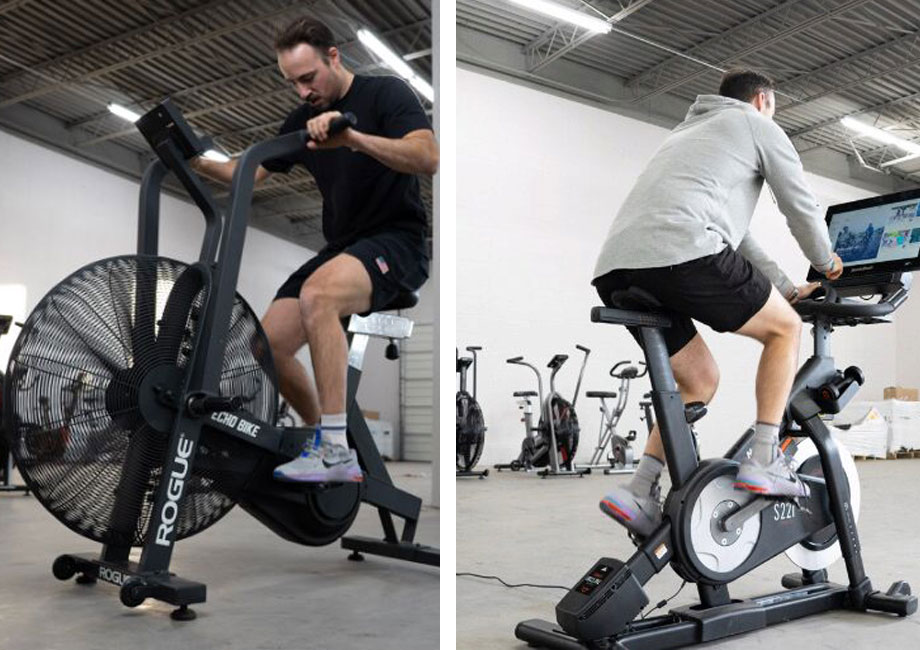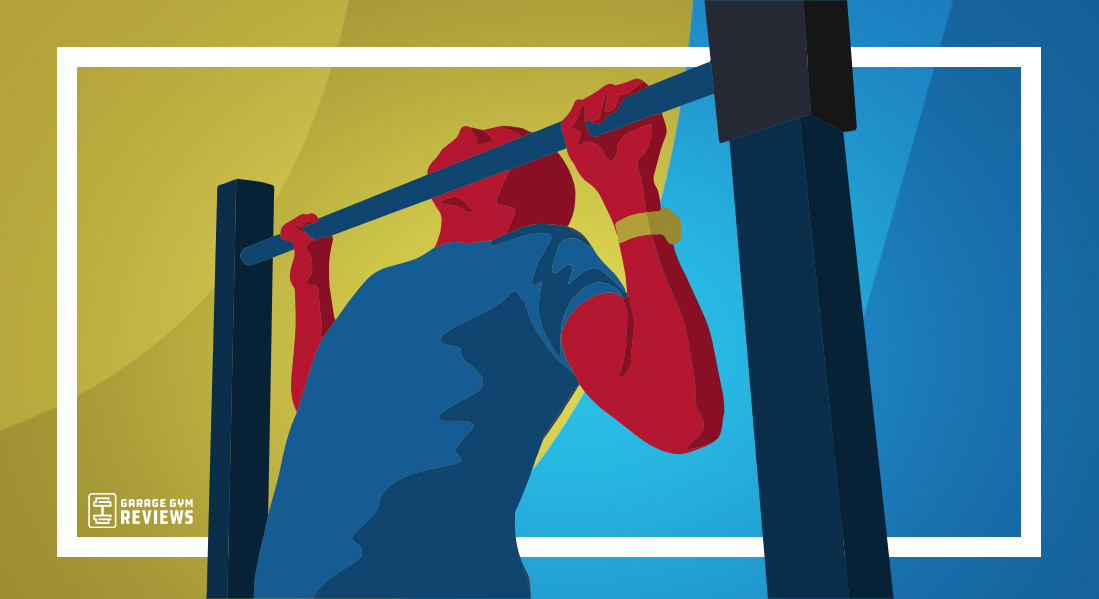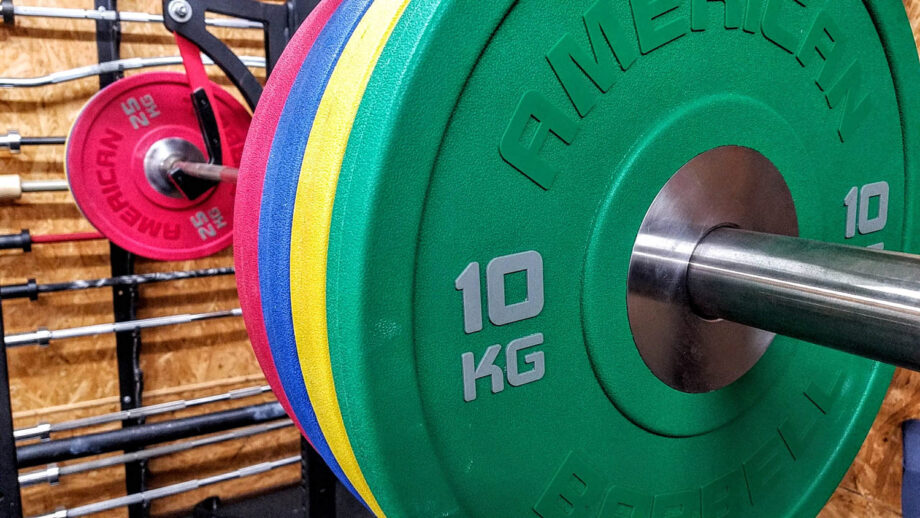Regardless of the type of bike you choose, indoor cycling training has been shown to improve your lipid profile1 (reduce cholesterol and triglycerides), lower blood pressure, and enhance aerobic capacity—all important things for cardiovascular health. Cycling can also contribute to weight loss, especially when combined with a healthy diet.
Knowing this, you’re probably eager to hop on a bike and start pedaling, but which piece of equipment should you choose? While there are several types of indoor bikes, air bikes and stationary bikes are what we’re here to discuss.
RELATED: Best Exercise Bikes For Home
Both have pros and cons, as well as shared and individual benefits. The best one for you really comes down to your fitness goals and what you’re hoping to get out of your cardio workout. In this air bike vs stationary bike guide, I’ll compare them side by side.
What Are Air Bikes?
Also called fan bikes, air bikes are a type of stationary bike operating on wind resistance. Foot pedals and handles are attached to a giant fan at the front of the bike. When you pedal, the fan starts to spin, creating air resistance. The faster you pedal, the more resistance it creates.
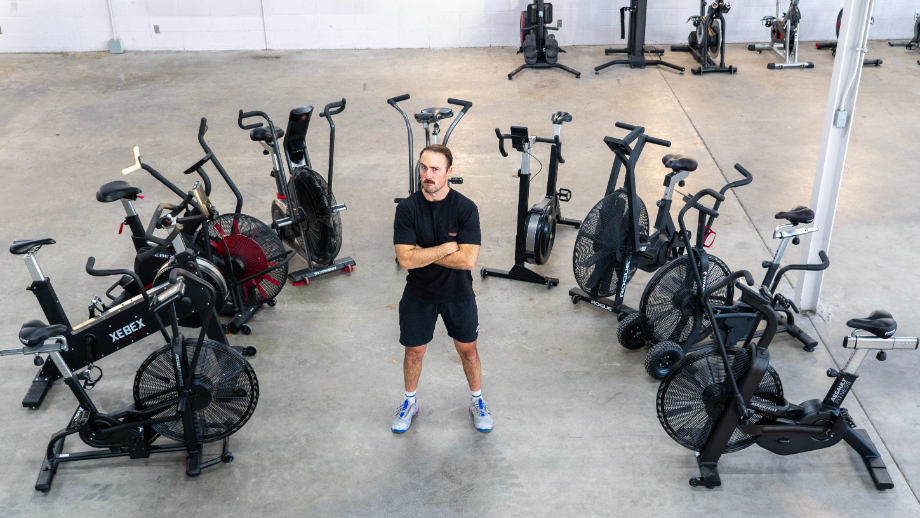
Benefits of Using an Air Bike
As mentioned, any type of indoor cycling can have massive cardio benefits, but there are some individual benefits of using an air bike as opposed to other types of bikes.
Full-Body Workout
For starters, air bikes provide more of a full-body workout than other types of exercise bikes. Because the handlebars move, and you have to pump them to really get your heart rate up, you engage your upper body as well as your lower body. This makes you work harder and contributes to a higher calorie burn.
More Efficient For Sprints
In addition to scorching calories in a short time, air bikes are considered efficient for other reasons. Sprint interval training—a type of high-intensity workout—on an air bike has been shown to improve cardiorespiratory markers2, like VO2 max and METs (metabolic equivalent of task), with less volume and a shorter duration than steady-state cardio.
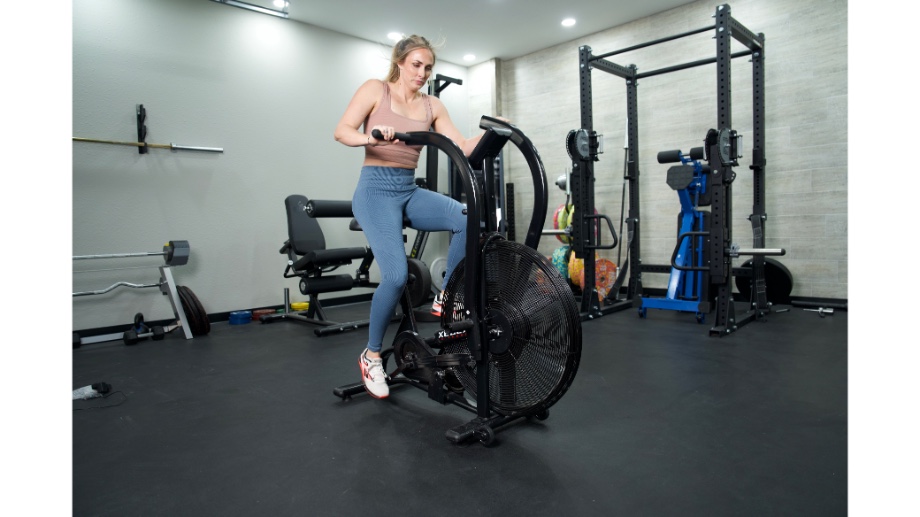
RELATED: Steady-State Cardio vs HIIT
Great For HIIT Sessions
Air bikes are great for high-intensity interval training (HIIT) in general, too. It’s easier to execute HIIT on an air bike because the resistance (and thus the intensity) automatically adjusts to your effort.
When you want to go hard, the bike will respond by increasing your resistance. When it’s time to recover, you just slow down, and intensity follows.
Also, according to a small 2022 study3, HIIT using an air bike can improve several health and athletic performance markers, like endurance (aerobic and anaerobic), VO2 max, and strength.
Helps Build Strength Through Resistance
While an air bike isn’t a substitute for weight lifting, the fan can offer a good amount of resistance—which can help you build up your strength over time, translating to more effective resistance training sessions.
What Are Stationary Bikes?
Stationary bikes are any indoor bike that doesn’t have traditional wheels. Technically, this can include air bikes, spin bikes, and recumbent bikes. But most often, when people refer to a “stationary bike,” they mean an upright bike that mimics the movements of an outdoor bicycle.

Benefits of Using a Stationary Bike
Stationary bikes come with a bunch of benefits of their own.
Low-Impact Cardio
Compared to running, stationary bikes put much less strain on your knees, hips, and feet. They offer a low-impact workout for those with joint issues or anyone trying to recover from (or avoid) injury.
RELATED: The Best Joint-Friendly, Low-Impact Cardio Exercises
May Help with Joint Pain
Because of its low impact, riding a stationary bike may help reduce pain and improve joint function. In one study published in Clinical Rehabilitation4 in 2021, researchers found that, compared to a non-exercise group, people with knee osteoarthritis had better sports performance and less pain when they regularly rode a stationary bike.
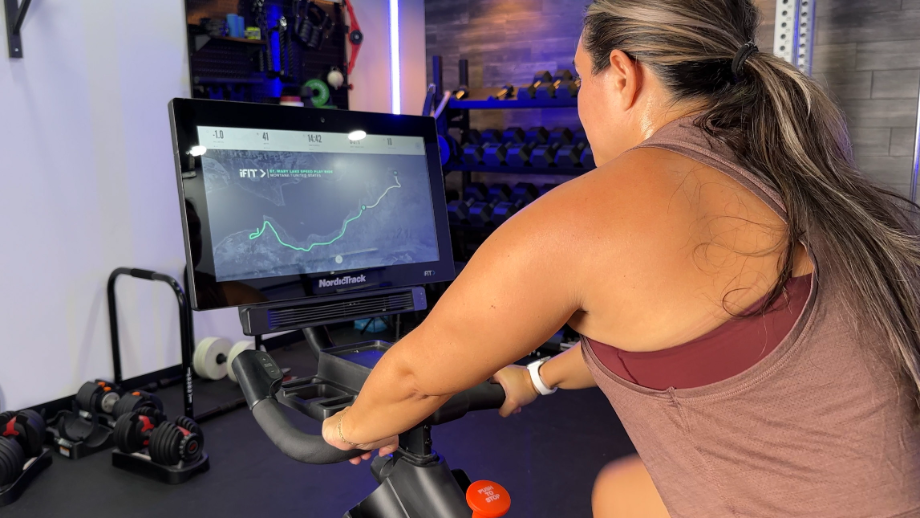
May Help Improve Balance
Stationary bikes are excellent cardio machines for older adults—partly because they’re low-impact, but also because they can help reduce the risk of falling. Stationary cycling can improve leg strength5, muscle endurance, balance and other functional abilities in healthy middle-aged and older adults.
Great For Beginners
They’re also a great entry point for beginners. While air bikes can quickly take the wind out of you (pun intended), you can cruise on low resistance and incline on a stationary bike. This is an excellent way to build up your cardiorespiratory fitness if it’s been a while since you’ve done cardio.
Air Bike Vs Stationary Bike: Comparison Table
There are many different models of each type of bike, and since they’re so different, the comparison can be a little apples-to-oranges.
That said, here’s a side-by-side look at the Rogue Echo Bike, our pick for the best air bike overall, and the NordicTrack S22i, our pick for the best exercise bike.
| Rogue Echo Bike | NordicTrack S22i | |
| Resistance levels | Unlimited (depends on how hard you pedal) | 24 |
| Console display | 8-inch black and white LCD display | 22-inch colored HD touchscreen |
| Programming | Intervals, target, heart rate tracking | iFIT compatible; hundreds of on-demand workouts |
| Bike weight | 123 pounds | 205 pounds |
| Max user weight | 330 pounds | 350 pounds |
| Dimensions | 55” L x 29.5” H W x 52.25” H | 61” L x 22” W x 58” H |
| Price | $895 | $1,999 |
Differences Between an Air Bike and a Stationary Bike
Now that you know the benefits of each type of bike, let’s take a look at the major differences.
Muscles Targeted
Air bikes have movable handlebars that mimic an elliptical. When you pedal, the handlebars also move. While your quads may be the first to feel it on an air bike, it will engage the major muscle groups in your upper and lower body and your core.
Stationary bikes have fixed handlebars. Like outdoor cycling, they’re lower-body centric, meaning they mostly engage the quads, hamstrings, and calves.
In short, air bikes target more of your muscles.
Calories Burned
Many experts say the average person can burn about 20 to 30 calories per minute on an air bike, for a grand total of 600 to 900 calories every half hour. According to Harvard Health6, you’ll burn about 315 to 441 calories while riding a stationary bike at a vigorous pace. While both are impressive, air bikes are the clear winner.

Difficulty Level
If the estimated calorie burn is any indication, air bike workouts are intense—there’s a reason CrossFit goers dubbed it “The Devil’s Tricycle.” While they’re easy enough for beginners to use—meaning there’s not much of a learning curve to start—they take more effort than stationary bikes and give you a nice total-body burn.
Stationary bikes don’t require as much effort because the resistance is manual with fixed handlebars. Granted, you can turn up the resistance, but they still allow you to pedal faster on a lower resistance level if you want it.
Resistance Levels
Instead of air, many stationary bikes are powered by magnetic resistance. There are two magnets on each side of the flywheel. When you increase the resistance, the magnetics get closer to the flywheel, making it harder to pedal. The reverse happens when you decrease the resistance.
Because of this construction, stationary bikes typically have a set number of resistance levels. You can choose a setting and the bike will adjust accordingly.
Air bikes have unlimited resistance. The fan directly reacts to your speed and force, so you don’t have to adjust the resistance manually as you ride. When you ride faster, the resistance increases. When you slow down, the resistance drops accordingly.
Technology
As far as technology goes, air bikes are pretty bare bones. Typically, you’ll have a small console, similar to what you see in a basic rower. This allows you to track distance, effort, and calories burned, among other basic metrics. Most offer heart rate tracking, but you’ll have to bring your own heart rate monitor. There may also be some built-in programs.
RELATED: Best Exercise Bikes With Virtual Courses
The technology in stationary bikes can run the gamut, but you can find smart bikes with 22-inch LCD screens and hundreds of on-demand workout programs for all different fitness levels.
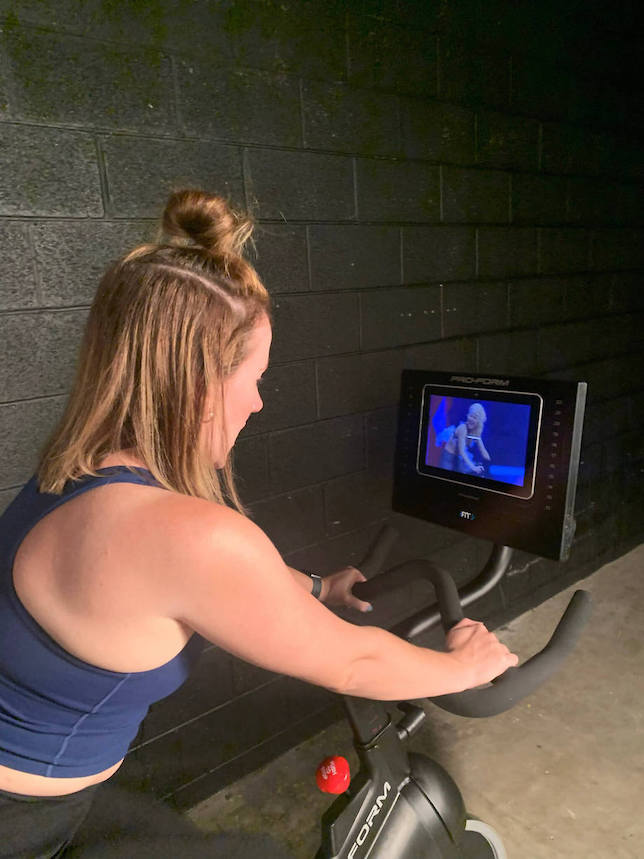
If you just want to hop on and ride, an air bike is more than enough. But if you want access to more training programs and/or like to stream while you do your cardio, the upgraded technology of a stationary bike may be more worth it.
Price
Upgraded technology does come at a price. You can get some of the most popular air bikes for under $1,000. The classic Assault Bike is $750, while the newest Rogue Echo Bike is about $900. The decked-out NordicTrack S22i—which we named the best exercise bike overall—is $2,000.
Noise
Air bikes are notoriously noisy, since you’re literally generating wind from a giant fan. On the flip side, stationary bikes, especially those that operate with magnetic resistance, can be near-silent.
This may not be a deciding factor for you, but it’s worth mentioning, especially if you’re hoping to do some indoor cycling in your home gym in the early morning hours when your kids or the rest of your household are asleep.
How To Choose Between an Air Bike and a Stationary Bike
Now that you know the benefits and the differences, how do you choose? Consider the pros and cons, and then narrow it down based on what best fits your fitness goals.
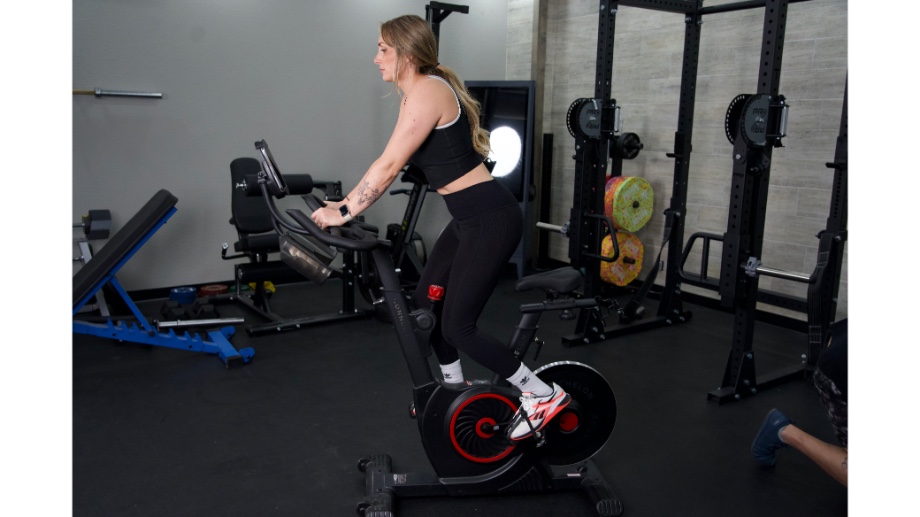
Air Bike
Pros
- Efficient, calorie-scorching workout
- Great for HIIT workouts
- Low-impact
- Unlimited resistance levels
- Full-body workout
Cons
- Can be really intense for beginners
- Not a lot of programming
- No real smart capabilities
Stationary Bike
Pros
- Great for beginners
- Low-impact
- Lots of available programming
- Can manually adjust resistance according to your goals
- Many price options
Cons
- Can get expensive
- Doesn’t burn as many calories
- Lower-body centric
Air Bike Vs Stationary Bike: Final Thoughts
If you’re after an effective cardio workout, you’ll get it with both bikes. That said, air bikes can be more intense, offering unlimited resistance levels and a total-body workout that helps scorch calories. Because of this, they’re a better choice for folks looking to take their cardio to the next level.
Stationary bikes are easy to use and have manually adjustable resistance, so you can really tailor your workout’s intensity. They also offer incentives, like large screens and on-demand workouts. This makes them a better fit for beginners or those who want more pre-programming.
Air Bike Vs Stationary Bike: FAQs
Are air bikes better than stationary bikes?
One type isn’t necessarily better than the other—it depends on what you’re trying to get out of your workout experience. Air bikes can be better for HIIT workouts and if you’re trying to up your calorie burn. But stationary bikes can be better for beginners and those trying to recover from injuries.
Are air bikes good for losing weight?
Yes, because air bikes can help you burn calories, they can be good for losing weight. You’ll burn about 600 to 900 calories in a 30-minute session with an air bike6. For comparison, you’ll burn about 315 to 441 calories in the same amount of time riding a stationary bike.
Is an air bike good for beginners?
Yes and no. Air bikes are easy to use, so in that regard, they can be good for beginners. But they are intense. If you’re new to cardio, an air bike might not be the first thing you want to try.
Can you get in shape on a stationary bike?
Yes, any cardio machine can help you “get in shape.” Cardio can help you burn calories and improve your heart health and cardiorespiratory fitness, which, in turn, can help you lose weight and work harder in the gym. But if you want to change your body composition—meaning decreasing your body fat and increasing lean muscle mass—you’ll need to weight train.
References
- Chavarrias, M., Carlos-Vivas, J., Collado-Mateo, D., & Pérez-Gómez, J. (2019). Health Benefits of Indoor Cycling: A Systematic Review. Medicina (Kaunas, Lithuania), 55(8), 452. https://doi.org/10.3390/medicina55080452
- Moghaddam, M., Cervantes, M., Cheshier, B., & Jacobson, B. H. (2023). Sprint Interval Training on Stationary Air Bike Elicits Cardiorespiratory Adaptations While Being Time-Efficient. Journal of strength and conditioning research, 37(9), 1795–1801. https://doi.org/10.1519/JSC.0000000000004483
- Schlegel, P., Křehký, A., & Hiblbauer, J. (2022). Physical Fitness Improvement after 8 Weeks of High-Intensity Interval Training with Air Bike. Sport Mont, 20(3), 75-80. https://doi.org/10.13140/RG.2.2.21669.58081.
- Luan, L., Bousie, J., Pranata, A., Adams, R., & Han, J. (2021). Stationary Cycling Exercise for Knee Osteoarthritis: A Systematic Review and Meta-Analysis. Clinical rehabilitation, 35(4), 522–533. https://doi.org/10.1177/0269215520971795
- Rissel, C., Passmore, E., Mason, C., & Merom, D. (2013). Two Pilot Studies of the Effect of Bicycling on Balance and Leg Strength Among Older Adults. Journal of environmental and public health, 2013, 686412. https://doi.org/10.1155/2013/686412
- Harvard Health Publishing. Calories Burned in 30 Minutes for People of Three Different Weights. Updated March 8, 2021.


